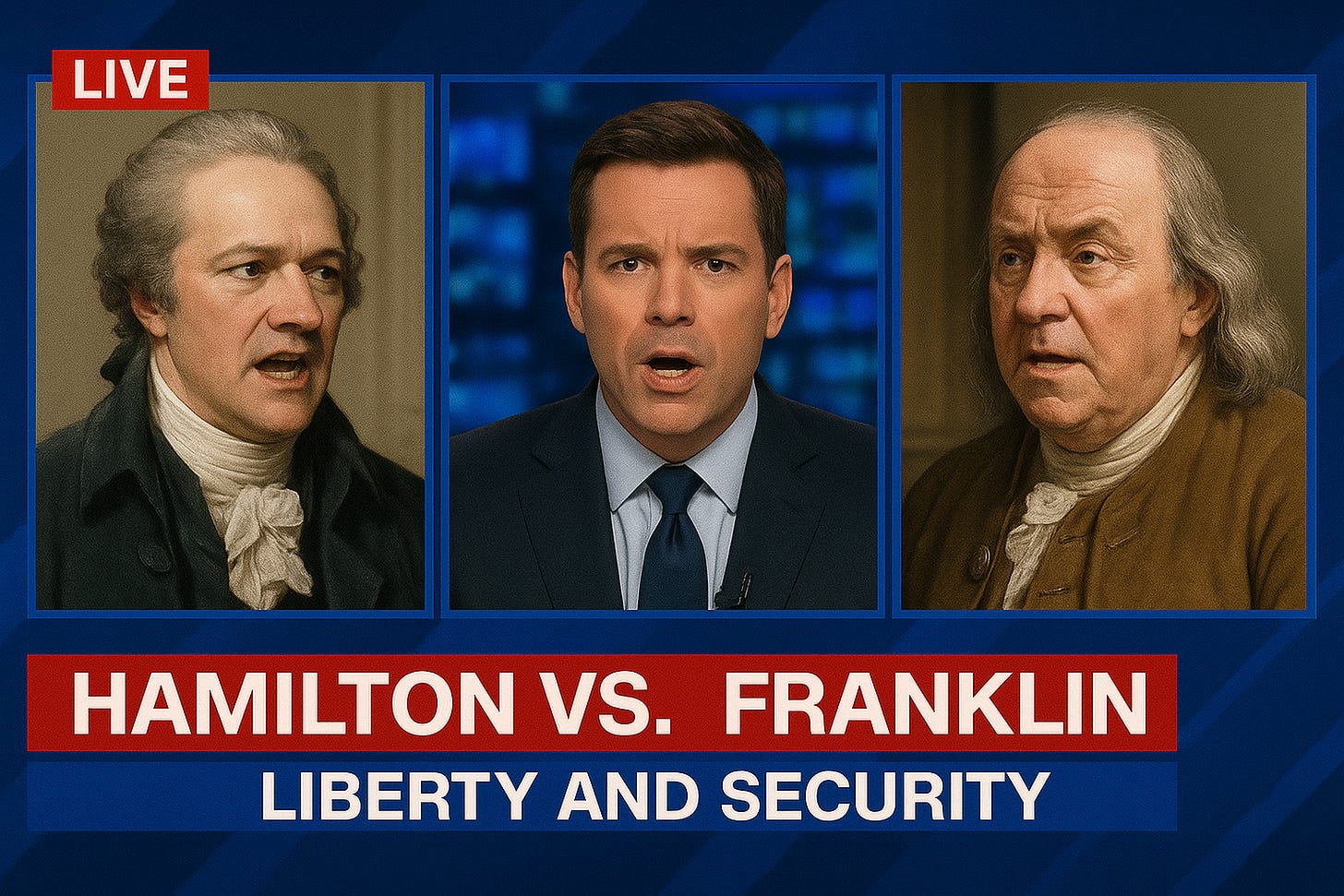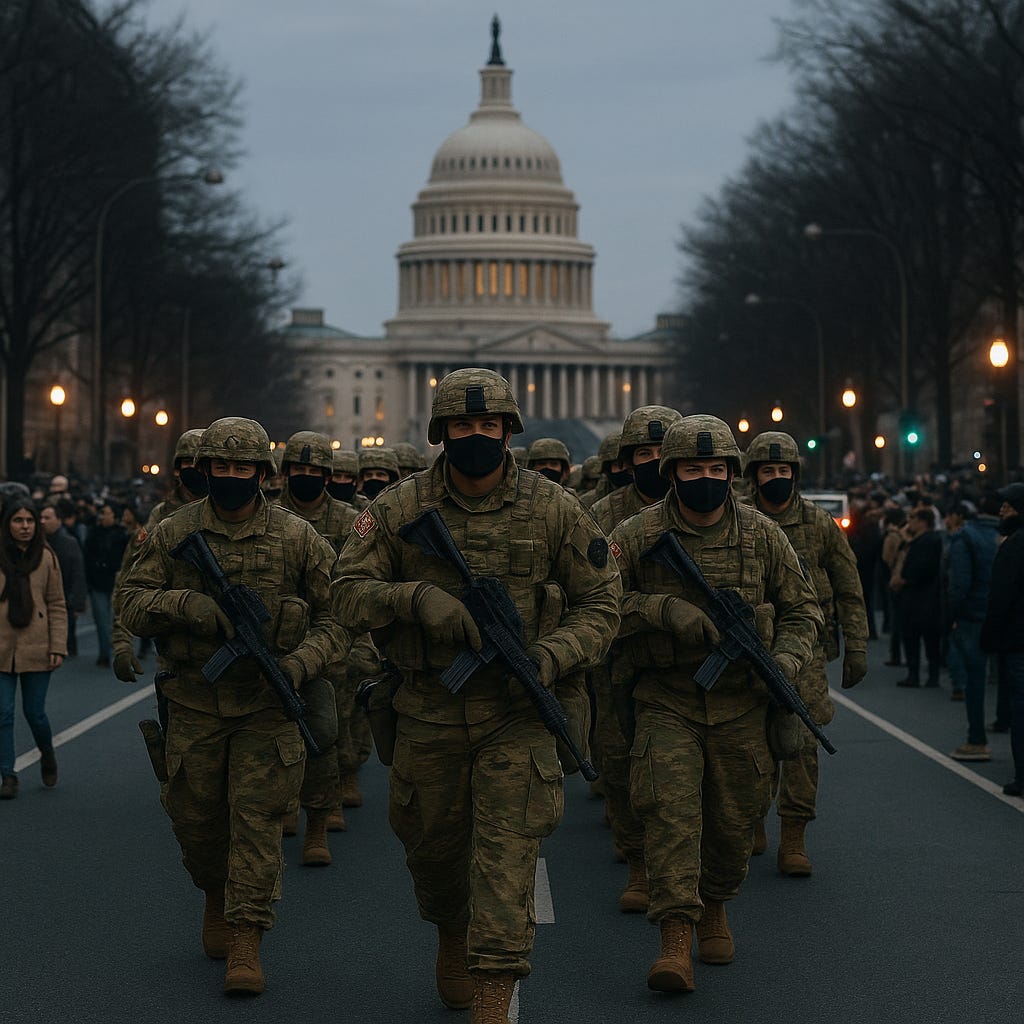The Federalists Reloaded | No. 15
An Imbecility of Government, A Tyranny of Order
By the time he reached Federalist No. 15, Alexander Hamilton had lost his patience. The earlier essays were still wrapped in persuasion and careful reasoning, but this one bursts out like a man banging his fist on the table. He calls the Articles of Confederation an “imbecility.” He warns that the nation has reached “the last stage of national humiliation.” And he lays down a blunt truth: “Government implies the power of making laws. It is essential to the idea of a law that it be attended with a sanction.” For Hamilton, laws without enforcement were not laws at all. They were suggestions dressed up as authority.
Benjamin Franklin would not have disagreed that government needs strength. Still, he carried a warning just as sharp: “Those who would give up essential Liberty, to purchase a little temporary Safety, deserve neither Liberty nor Safety.” To Franklin, too much enforcement power was as dangerous as too little. The line between security and tyranny could vanish in an instant, and once liberty was surrendered in the name of order, it would not be returned.
Between Hamilton’s impatience with weakness and Franklin’s fear of power lies the tension that still defines American politics. The Anti-Federalists lent Franklin philosophical depth. Brutus warned that the Constitution would create a government whose powers “extend to every case that is of the least importance.” Centinel foresaw states reduced to “the shadow of power.” Cato predicted rulers who would be “ambitious, avaricious, and insatiable.” The argument was never simply about designing a government. It was about whether order could be secured without smothering freedom.
Chicago: Hamilton’s Demand, Franklin’s Warning
Chicago has long been a city where questions of safety and liberty collide. Its homicide numbers make headlines, its neighborhoods experience spikes of violence, and its politics are consumed with the balance between enforcement and trust. In 2025, the Trump administration launched “Operation Midway Blitz,” sending Homeland Security officers into the city to target undocumented immigrants under the banner of crime reduction. Federal officials argued they were stepping in where local authorities had failed. City leaders accused Washington of overreach, saying the operation undercut local policing and deepened mistrust among immigrant communities.
Hamilton would have had no patience for the mayor’s protests. In his eyes, the government’s first duty is to enforce order, and if local officials cannot or will not do so, then national authority must. What good is liberty if residents cannot walk the streets without fear? What good are rights on paper if the institutions meant to defend them lack the force to act? Hamilton would have pointed to Chicago and declared it proof that laws without sanctions are hollow.
Franklin’s rejoinder remains powerful. He would ask what is lost when federal authority overrides local accountability. He would point to frightened families caught in raids and note how the pursuit of safety corrodes the liberty of those least able to defend themselves. He would remind us that once the federal government claims the right to insert itself into city streets, it rarely leaves voluntarily. Brutus anticipated this danger, warning that under the new system “the laws of the general government being paramount to the laws and constitution of the several states, the latter must give way to the former.” Chicago, in his view, would be living proof.
Los Angeles 2025: When Troops Patrol the Streets
If Chicago captures the day-to-day friction of enforcement, Los Angeles in 2025 was Hamilton’s argument made flesh and Franklin’s nightmare realized. After a series of ICE raids sparked massive protests across the city, President Trump federalized the California National Guard without the governor’s consent. Within days, Marines and thousands of Guard members filled the streets. Curfews were imposed, checkpoints were established, and neighborhoods that had been sites of protest resembled occupied territory.
Hamilton would have nodded grimly. He had written that government exists precisely because “the passions of men will not conform to the dictates of reason and justice without constraint.” To him, the burning cars, broken windows, and mass demonstrations proved that civil government needs the capacity to act decisively, even militarily, to restore order. In Hamilton’s logic, the alternative was anarchy, and anarchy was the swiftest path to the death of liberty.
Franklin would have shaken his head. He would have pointed to the armored vehicles rolling through Los Angeles and said: here is your “temporary safety,” purchased at the cost of essential liberty. The right to assemble, the freedom to dissent, the basic autonomy of a state, all bent under the weight of federal boots. Cato’s words echo across the centuries: “An army, quartered in the midst of a populous city, has been ever considered a most hostile invasion of the rights of mankind.” The federal judge who ruled the deployment illegal under the Posse Comitatus Act may have provided legal clarity, but Franklin and the Anti-Federalists had already provided the moral one.
The United States had once again wrestled with Hamilton’s demand for order and Franklin’s warning about liberty, and the results looked like both vindication and betrayal, depending on which side you took.
Washington, D.C.: A Capital Occupied
If Los Angeles showed what happens when federal power expands outward, Washington, D.C., in 2025, demonstrated what happens when it turns inward. That August, the president declared a “crime emergency” in the capital, federalized the Metropolitan Police Department, and deployed National Guard units across the city. Mayor Muriel Bowser was sidelined. The capital of a democratic republic looked and felt like a city under occupation.
Hamilton would have found the move consistent with his principles. How could the very seat of government tolerate lawlessness in its own streets? If Congress had once been too weak to enforce its laws under the Articles, here at least the federal government was proving it had the teeth to act.
Franklin’s voice again haunts the story. Washington is where the federal government is already most potent, and Franklin would see danger in turning the nation’s capital into a demonstration of force rather than a demonstration of democracy. Brutus anticipated this exact danger: “The authority of the federal government will pervade every part of the United States: it will… swallow up all the power of the courts in the respective states.” To Franklin, liberty is not preserved by troops at intersections or edicts from the White House. It is preserved by citizens who know the government fears them more than they fear it. Once the people’s city becomes the government’s fortress, liberty has already slipped away.
The National Debt: Hamilton’s Nightmare, Franklin’s Fear
The Hamilton-Franklin contrast is not limited to law enforcement. It is written just as clearly into the national debt. Hamilton was obsessed with America’s financial reputation. He warned that unpaid debts would render the nation ridiculous abroad. “We have neither troops, nor treasury, nor government. We are destitute of every apparatus of revenue.” For him, fiscal impotence was a national disgrace.
Today’s debt-ceiling standoffs and credit downgrades would have been Hamilton’s nightmare. He would have argued for stronger fiscal authority, broader taxation, and stricter enforcement to ensure the United States honored its obligations. To Hamilton, liberty without solvency was a fantasy.
Franklin, joined by the Anti-Federalists, would have seen something else. A federal government strong enough to borrow endlessly is strong enough to spend endlessly. Endless spending is its own form of tyranny, mortgaging the liberty of future generations who inherit the bill without having had a say in the bargain. Cato warned plainly of this danger, writing that the proposed federal system would produce rulers who are “ambitious, avaricious, and insatiable.” In his view, unchecked national power would eventually consume the people’s resources as well as their rights. If Hamilton’s warning was about weakness, Franklin’s was about appetite. Both dangers remain.
The Reloaded Take
Hamilton was right that a government without enforcement is little more than a suggestion. His urgency gave the young nation the strength to survive its infancy. But his solution carried its own peril. A government powerful enough to compel order is also powerful enough to dictate the boundaries of freedom. That is the risk Franklin warned us about, and it is the risk that still defines American politics today.
Franklin’s insight remains the more complicated truth. “Those who would give up essential Liberty, to purchase a little temporary Safety, deserve neither Liberty nor Safety.” Safety purchased at the cost of liberty is never secure, and liberty once surrendered rarely returns. The Anti-Federalists understood this when they warned that consolidation of power would reduce the states to empty shells and the people to subjects of a distant center. Our own history bears them out. Each crisis brings new claims of necessity, and each necessity leaves behind a permanent expansion of power.
We may admire Hamilton’s energy, but Franklin’s caution is what keeps a republic free. America cannot measure its strength only by its ability to enforce order. It must also measure its restraint in preserving liberty. Hamilton gave us urgency, Franklin gave us perspective, and Franklin’s warning still rings loudest today.
Order without freedom is tyranny in disguise.






Achieving balance between order and liberty in society that grows more complex by the day is such a challenge. Thank you for taking the time to write these essays!
Scott--I could not have enjoyed this more. I admire your logic, your learning, and your erudition. This substack is superb.